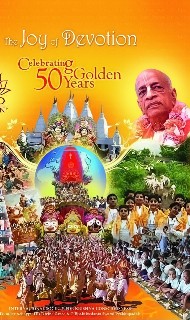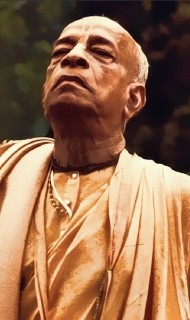By Madhava Smullen

Devotees from the East Coast of the U.S. and beyond are warmly invited to attend the first ever Rathayatra festival in the city of Wheeling near New Vrindaban, West Virginia on Saturday July 16th.
Previously, since 1973, New Vrindaban residents held their own local, rural Rathayatra, a sweet and bonding tradition with a certain rustic charm.
“Lord Jagannath had several different carts in the early years,” recalls Rupa Ramesvari Dasi. “One year, He had a stage coach like you see in cowboy movies; another He rode Radha-Vrindabanchandra’s teakwood chariot; and for a long time, He had a simple trolley car.”
Then in the early 2000s, Malati Devi, one of the organizers of San Francisco’s 1967 Rathayatra – the first outside India – commissioned a proper traditional chariot to be built. Along with a small cart for the children, and American-style prasadam, the festival grew in popularity as a kind of spiritual family picnic.

Lord Jagannath Baladeva and Subhadra on chariot with pujaris Jayasri dasi and Vani dasi.
But of course, the Lord of the Universe is for everyone, and when Srila Prabhupada transplanted Rathayatra to the Western World in the 1960s, he focused on cities to reach the most people possible.
“So we thought the 50th anniversary of his ISKCON would be a wonderful opportunity to reach out to our neighbors, particularly the people of Wheeling,” says organizer Vrindavan Das. “For years, we’ve been a bit isolated, and there’s been a gap between the people of Wheeling and New Vrindaban. We want to bridge that gap, share what we have with them, and educate them about our culture and beliefs.”
Wheeling authorities and the Wheeling-Ohio County CVB (Convention and Visitors Bureau) agreed, excited about adding a “Festival of India” to their already-existing roster of Greek, Lebanese, and Italian festivals.
“We are looking forward to July 16th’s Festival of India as the latest addition to Wheeling Heritage Port’s summer schedule of events,” says CVB marketing assistant Michael Biela. “This inspirational festival will bring the wonders and enchantments of New Vrindaban and the Palace of Gold to downtown Wheeling for a unique experience that the entire family can enjoy!”

Ratha Yatra 2015 in New Vrindaban
Some three thousand people are expected for the event, including about 500 devotees from many locations such as New Vrindaban, Pittsburgh, Columbus, Cleveland, and New York City.
Beginning at noon, the two-and-a-half-hour Rathayatra parade will make its way from Water Street at the WesBanco Arena through the main streets of busy downtown Wheeling and back.
It’s bound to be quite an eye-catching sight for locals, most of whom will never have seen anything like it before. New Vrindaban’s five-foot tall Jagannath, Baladeva and Subhadra Deities will beam out from Their hand-carved chariot, its vibrant red and yellow canopy topped with a gold spire rising thirty feet into the air. Srila Prabhupada’s murti will also be on board, with a huge banner above him showing his photo and proclaiming “ISKCON: 1966 – 2016, the Joy of Devotion” and “Celebrating 50 Golden Years” in sparkling golden letters.

Devotees pulling Lord Jagannath’s chariot in New Vrindaban 2015
Below, hundreds of devotees will be pulling the cart with thick ropes, dancing and chanting in ecstasy, and waving bright, multi-colored flags and balloons in the air. And to refresh the crowd, they’ll be distributing prasadam watermelon, milk sweets and drinks.
Following the parade, there’ll be a cultural spectacular from 3pm to 6pm at the amphitheater in Heritage Port Park, a beautiful space with the magnificent Ohio River as its backdrop.
Lokah Bhakti, a regular favorite at New Vrindaban’s Festival of Colors, will bring his unique brand of energy and Bhakti dance music, along with mantra rock by local New Vrindaban devotee bands. A “color throw” of dyed powders every hour will add to the live music experience and tie in with Festival of Colors, the event for which New Vrindaban is best known locally.
Meanwhile there will also be Bharat Natyam dance by Mansee Singh from Columbus, Bhangra Dance by the Carnegie Mellon University Bhangra Group, and bhajans and kirtan by kirtaniyas from New Vrindaban and Queens, New York.
Adding extra depth will be dramatic storytelling about Lord Jagannath’s appearance by award-winner Sankirtan Das. Sankirtan, who speaks at various universities, has been described by audience members as narrating “with such vivid enthusiasm that one can ‘see’ the scenes as if they were staged.”
Wheeling Mayor Andy Mackenzie will also attend and give a speech. Other VIPs, such as the county commissioner and CVB directors, have been invited and are yet to confirm.

Lokah Bhakti, yoga instructor and entertainer, on stage at Festival of Colors 2015 in New Vrindaban.
Creating a lively festival vibe, there will also be a number of activity tents hosting a “mantra meditation” japa chanting experience; yoga classes by Lokah Bhakti and New Vrindaban’s own Ananga Manjari; face-painting, music, clowns and yoga for the kids; and a Gita Walk where people will take steps while reciting verses on the soul, reincarnation and devotion.
Finally, for the palate there will be food booths selling Indian, Italian and Mexican prasadam cuisine from New Vrindaban’s Govinda’s Restaurant, as well as smoothies and drinks. And as with most of ISKCON’s spiritual public festivals, there will also be a charitable aspect, with about one and-a-half-thousand free plates of rice, dahl, subji and halava to be distributed.
“It’s going to be a great day of good clean family-friendly fun,” says Vrindavan. “We look forward to developing friendships with the people of Wheeling, and sharing our culture with them.”





 By Srila Bhaktivinoda Thakura
By Srila Bhaktivinoda Thakura By ISKCON 50 Global Committee
By ISKCON 50 Global Committee By Romapada Das
By Romapada Das









 By Carsani devi dasi
By Carsani devi dasi By Mahatma Das
By Mahatma Das





 By Hari Narayana Das
By Hari Narayana Das